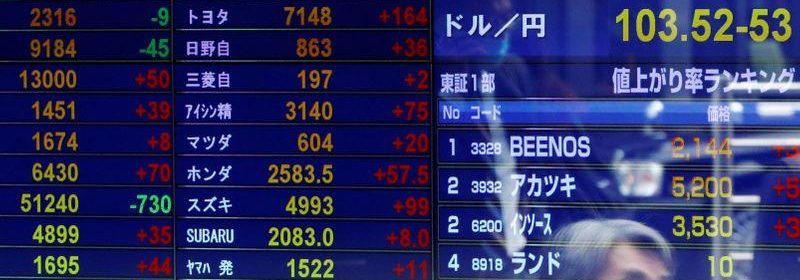Asian share markets edge higher on pandemic recovery signals

HONG KONG (Reuters) – Asian share markets advanced marginally on Tuesday as investors looked to signs of recovery from the coronavirus pandemic as major economies around the world reopen.
MSCI’s broadest index of Asia-Pacific shares outside Japan was just 0.15% higher heading into the Asian afternoon session in trading thinned by holidays in China and Japan. Hong Kong’s Hang Seng Index was trading 0.3% higher at 28,441.95.
Australia’s S&P/ASX200 edged up 0.4% to 7,056.3 ahead of a the Reserve Bank of Australia meeting at which it is expected to keep the official cash rate on hold at 0.1% while it awaits further signs of the domestic economy’s rebound from the pandemic-led downturn.
A statement following the decision at 0430 GMT will be monitored for indications whether the unprecedented quantitative easing programme there could start to be tapered.
The mildly positive tone in Asia was broadly in line with that on Wall Street overnight, where upbeat earnings, news of cities reopening and a dovish Federal Reserve helped offset a disappointing report on manufacturing activity.
While that combination is also causing investors to position for stocks to defy the customary ‘Sell in May’ adage, they have turned cautious ahead of key U.S. services data due on Wednesday and non-farm payrolls numbers on Friday.
“Dovish tones from the Fed and an extraordinary fiscal stimulus from the Biden Administration are fuelling optimism that the U.S. economy will strengthen further during 2021,” said Stephen Koukoulas, managing director at the Canberra-based Market Economics.
“Attention is also moving the U.S. payrolls data this Friday where close to 1 million new payrolls and an unemployment rate back down towards 5.6% is set to reinforce this upbeat sentiment.”
Taiwan was an exception in the region, with stocks there dropping by more than 3% in what could be their worst session since February 26, after a sudden spurt in coronavirus infections. The index is up about 12.8% for the year, which ranks it as one of the strongest performing markets in the region.
Mega International Investment Services Corp manager Alex Huang said the falls were due to concerns about an uptick in domestic COVID-19 infections in Taiwan and the overnight drop in U.S. tech stocks.
“The pandemic situation really is a bit complex, and the fall in U.S. tech stocks has also been a burden,” Taipei-based Huang said.
Japan and mainland China’s markets remained closed on Tuesday for holidays dampening trading volumes across the region.
Monday’s session on Wall Street saw the Dow Jones Industrial Average end 0.7% higher at 34,113.23 points, while the S&P 500 gained 0.27% to 4,192.66 with most of the gains concentrated in industrial and commodity shares.
The Nasdaq Composite dipped as technology stocks lagged sectors investors saw as beneficiaries of a pandemic recovery.
Energy stocks also gained on the back of higher oil prices.
In the Asian session, Brent crude was trading up 0.12% at $67.64 while U.S. light crude was 0.12% higher at $64.56.
“Crude oil gained (in U.S. trading) as easing restrictions in the U.S. and Europe raise hope of stronger demand. The European Union is planning to ease restrictions on vaccinated travellers over the summer,” ANZ economists said in a note to clients.
“This comes as several countries emerge from lockdowns amid a fall in new infections of the coronavirus.”
U.S. Treasury yields fell on Monday after data showed manufacturing activity growth slowed in April amid supply chain challenges, and despite the Treasury Department’s announcement of a much bigger borrowing programme for the second quarter.
The benchmark 10-year yield, which hit a session low of 1.578%, was last down 3 basis points at 1.6011%, holding well below a 14-month high of 1.776% reached on March 30.
Source: Read Full Article
